Bulk-generate & schedule posts in seconds with Smart Scheduling. Try now!
Niche marketing: Strategies, benefits, and future trends

Marketing is rapidly evolving, thanks to new technologies and innovative ideas. Niche marketing might be new to startups, budding entrepreneurs, and micro-influencers, but top brands already know how to capitalize on every marketing strategy.
Successful digital marketers build strategies that involve multiple promotional concepts to touch the target audience on every level. They don’t just eye ready-to-buy customers but also focus on nurturing leads.
One of those strategies is niche marketing. Before we discuss this marketing tactic in depth and its different aspects, let’s first understand the basics!
The easiest way to manage and grow your social channels.
Try ContentStudio for FREE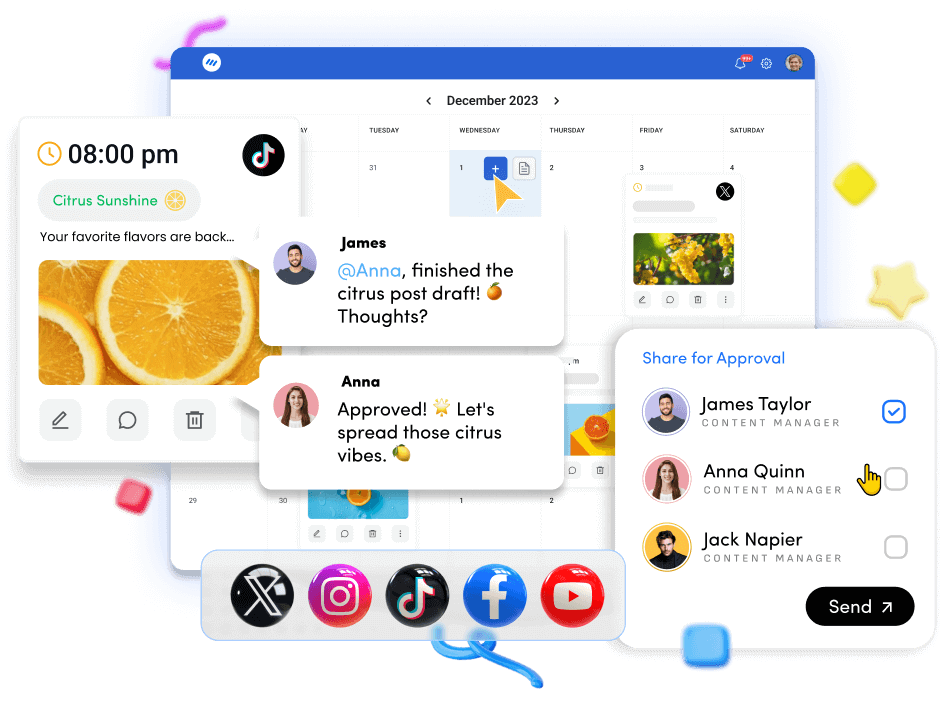
What is niche marketing?
Niche marketing is a marketing strategy that focuses on promoting and selling a product to a specific segment of the audience.
The chosen segment of the audience is highly targeted prospects with the highest potential to convert. Plus, most of them either need the product or at least have the financial capability to test it out.
The evolution of niche marketing in today’s digital landscape
It’s no surprise that niche marketing has undergone a significant transformation over the last decade or so. Previously, brands used to see it as a marketing strategy with limited budgets, but things have significantly changed.
In fact, niche marketing is now dominant in digital strategy, leveraged by startups and global corporations to build trust, authenticity, and engagement.
The shift from mass marketing to personalized engagement has undoubtedly fueled the rise of niche marketing. However, two factors are crucial to the cause.
The first is the mass adoption of social media worldwide. Platforms like YouTube, Instagram, Facebook, TikTok, X, Reddit, and Pinterest have made discovering and engaging with niche communities easier.
The second is the advent of artificial intelligence (AI). Now, social media and digital marketing tools use advanced features to segment audiences based on hyper-specific interests, behaviors, and demographics.
As AI becomes more advanced, personalization is no longer optional. According to HubSpot,74% of consumers feel frustrated when website content is not personalized, emphasizing the need to go niche. No wonder organizations, brands, and influencers that adopt a niche-first strategy are seeing increased ROI and stronger customer loyalty.
The evolution of niche marketing reflects a broader shift toward brand loyalty, authenticity, niche relevance, and human connection in the digital marketing space. Today’s most successful digital brands are not trying to speak to everyone; they’re just trying to talk to the audience that matters to them. And that’s the future of marketing.
Why niche marketing matters more than ever
Marketing has never been this relevant. Brands, small businesses, and entrepreneurs are better prepared and equipped to capitalize on the AI-powered tools and technologies for targeting customers beyond borders. Here are the reasons why niche marketing matters now more than ever:
Customers prefer personalized offers.
A primary reason for glorifying niche marketing is that most customers are no longer interested in one-size-fits-all marketing ideas. They expect brands to understand their specific needs, interests, and problems. Therefore, niche marketing allows businesses to have a clear picture of the target audience, allowing them to offer personalized solutions that feel more relevant and genuine.
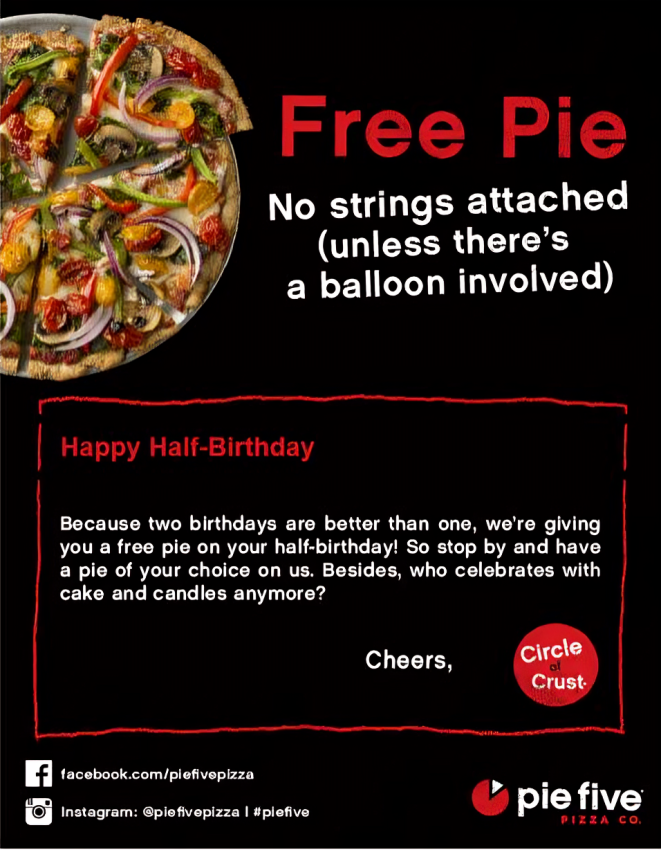
Billions of posts are being published online every second
Millions of users post billions of posts across blogs, social media platforms, forums, and UGC sites. So, it’s easy for a brand to get lost in the noise. Niche marketing helps brands stand out by focusing on a smaller market segment. It allows brands to speak directly to a niche audience, which makes the message more noticeable.
Social media favors specialized, niche content.
Undoubtedly, social media platforms are built around algorithms understanding relevance and engagement through user behaviors. Niche content performs better because it’s more targeted and resonates deeply with a specific group. Whether TikTok, Instagram, or YouTube, niche content often drives stronger loyalty and interaction.
Improves customer loyalty and retention
Customer loyalty drives retention and engagement. When a brand consistently addresses the unique needs of a niche audience, it builds long-term relationships. The customers feel heard and valued, making them more likely to return, refer others, and become brand advocates. Niche marketing turns casual buyers into loyal fans.
Read more: Client retention strategies for agency growth
Brands experience better ROI
One of the reasons it’s essential to implement niche marketing is that brands, influencers, and agencies get a better return on investment. Since they are reaching out to a specific audience segment interested in the product, the offer will likely increase conversions. So, niche marketing can skyrocket ROI.
These are some of the many reasons for paying attention to niche marketing.
How to define a niche market
Let’s try to comprehend the thought process behind defining a niche market:
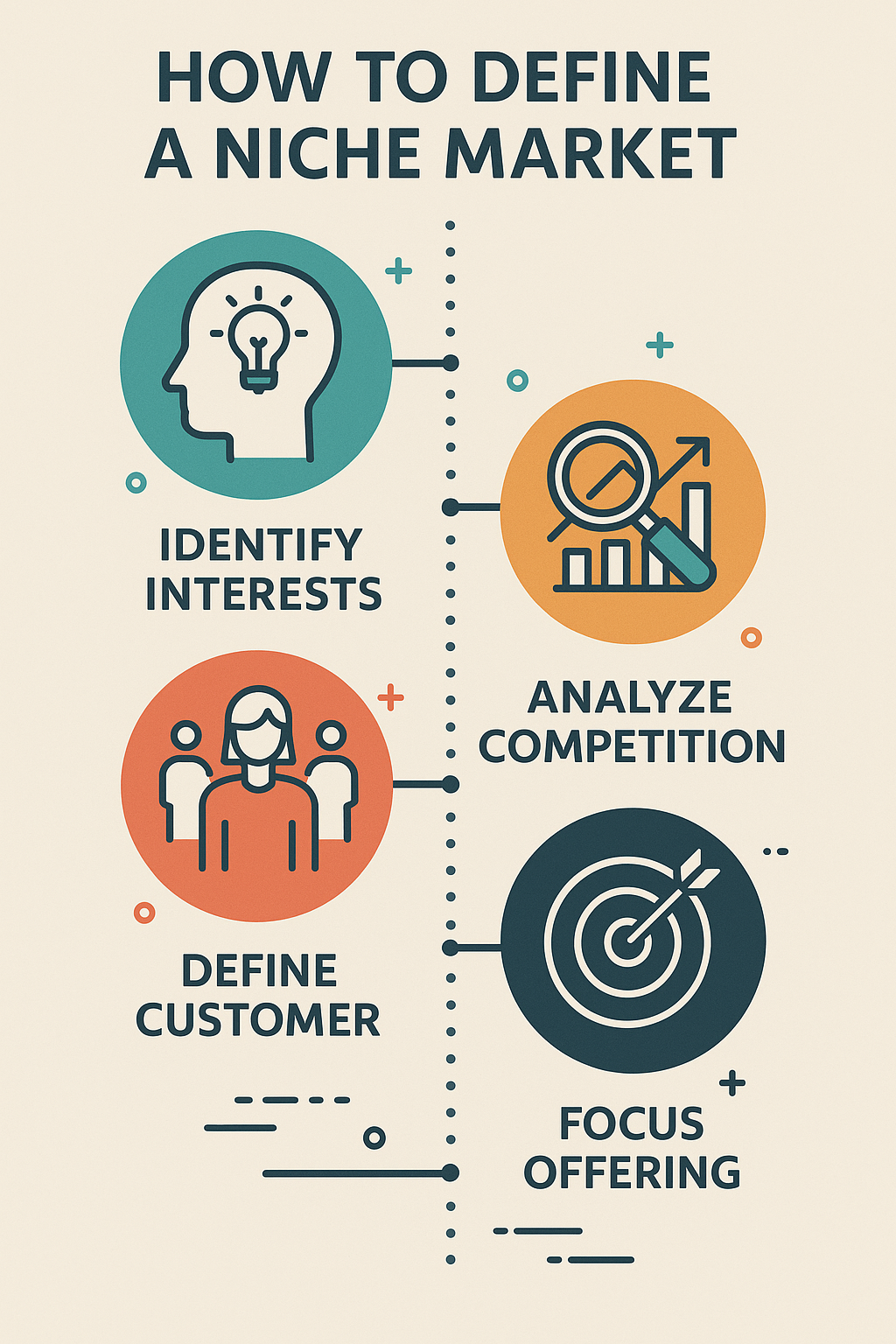
- Choose an industry to enter
The first and foremost part of defining a niche market is to pick an industry. It’s the fundamental part of the process. Selecting a niche market usually refers to going after a specific industry segment. Once the industry has been chosen, you can follow the drill and move on to the next part.
- Identify the market gaps
The next step in defining a niche market is identifying the market gap, meaning figuring out what’s missing in the market. It’s best to offer something valuable that doesn’t exist just yet. This way, you could fill the market gap while pursuing niche marketing domination.
- Focus on a specific audience segment
Prioritizing the specific audience segment that might be interested in your product or service is the best approach in the pursuit of identifying the niche market. Setting your focus on the target audience segment allows you to ignore the fluff and eye the potential customers. It’s an integral part of niche marketing exploration.
- Create a solution with a unique value proposition
Identifying and focusing on the niche market won’t bear any fruit unless you create a product that offers a unique value proposition to potential customers. So, always try to come up with a customized product for niche marketing that solves their problem and quickly becomes irresistible.
- Analyze the competition to create better offers
Defining the niche market won’t be completed without pinpointing the competitors in the market. Once competitors are identified, it’s vital to analyze their work to stay ahead of them. Neglecting the competition in the niche market means you’re missing out on the competitors’ strategies. Spying on competitors is an important element of digital marketing.
ContentStudio has a competitor analysis tool that lets users discover social media competitors. So, that’s how you can define a niche market to streamline your marketing process.
Identifying your niche market
Identifying the niche market means getting some idea of your target audience, where they exist, and, more importantly, what they want. Let’s crack this topic open:
- Understand your interests or expertise
Start by exploring what you’re passionate about or knowledgeable about. Your niche should align with your interests, as it helps you stay motivated and build authority over time. Plus, you sound like an authority when you’re passionate or knowledgeable about the subject.
- Research your target audience
Hunt for every potential platform where your audience might exist. Use the needs, wants, and challenges to locate your audience who might be interested in your topic. Don’t hesitate to try different social platforms, forums, blogs, groups, and communities to find and research your target audience.
- Study the competition
It’s essential to identify your competitors for many reasons, one of which is to identify your niche market. Search for other experts who are already serving your potential niche. Analyze their content, products, and customer engagement. A niche with competition shows demand, but make sure it still has some space left for you to find a unique angle and serve the audience.
- Identify problems you can solve
A strong niche marketer solves specific problems for the targeted audience. Think about how your skills or product can improve someone’s life or fill a gap in the market. Finding the potential audience problems sometimes can lead to identifying the niche market.
- Test and validate your ideas
It won’t hurt to test your ideas, concepts, and solutions regarding the niche market. Don’t hesitate to do small experiments like blog posts, social media content, free resources, or social media ads. Track the response and adjust your offering based on feedback.
- Refine your niche over time
Keep in mind that your first niche choice doesn’t have to be final. As you grow, you’ll learn more about what works and what doesn’t. Refine your focus to better serve your audience and stand out.
Once you have successfully identified your niche market, you can be as creative as you can be with offering unique solutions or products that aren’t being offered.
Benefits of niche marketing
Let’s take a look at some of the key benefits of niche marketing:
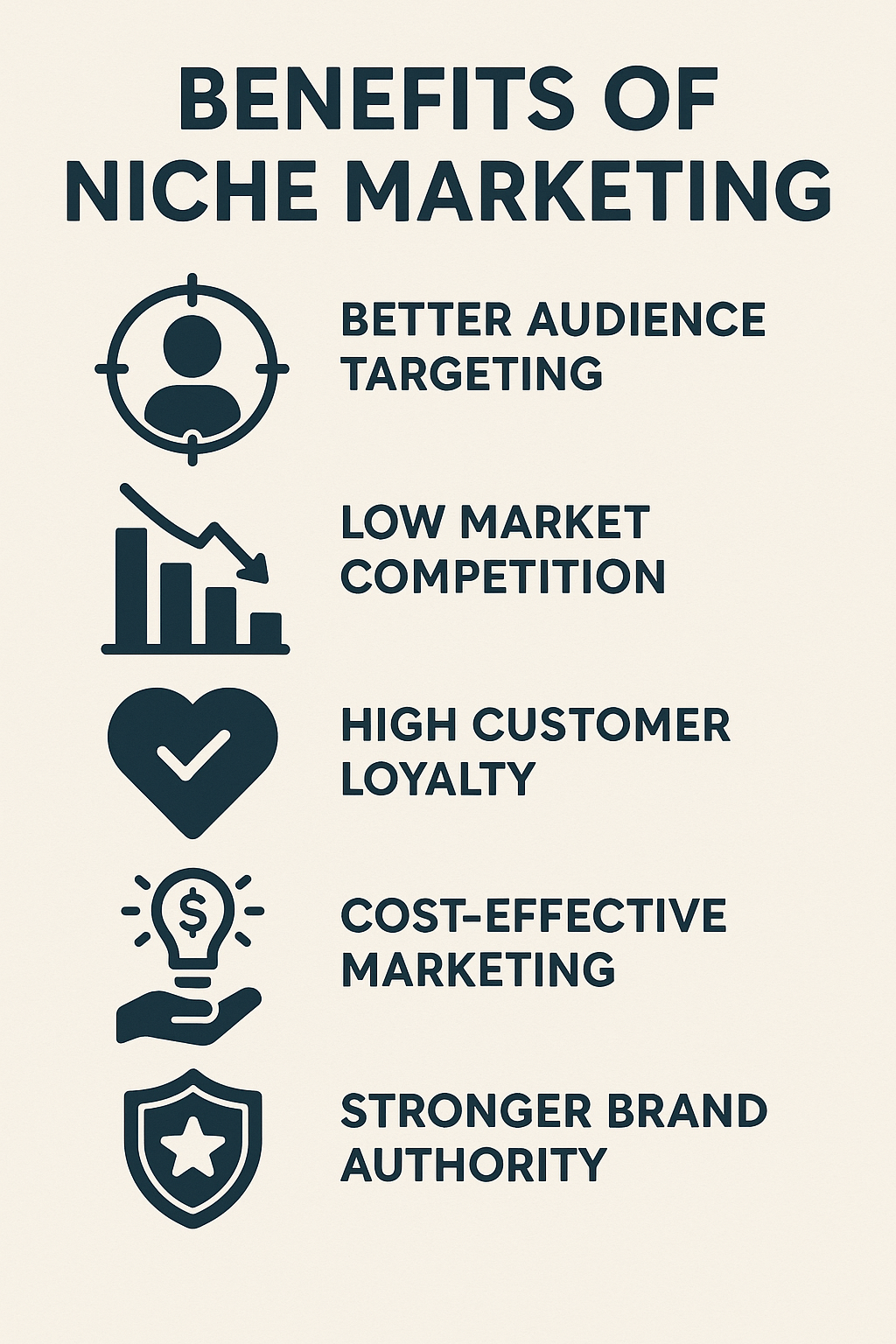
1. Better audience targeting
Niche marketing allows marketers and brands to focus on specific groups of audiences who truly need their product or service. This makes your campaigns more targeted and effective.
2. Low market competition
When you serve a specific segment of the audience, you avoid competing directly with many established brands. It’s easier to stand out when you’re not trying to please everyone.
3. Higher customer loyalty
Customer loyalty is crucial to getting repeat customers. Niche audiences tend to be connected with the brands that serve them well. The reason is that customers feel understood and valued by certain brands. When your brand speaks directly to their needs, they’re more likely to stay loyal and refer others.
4. Cost-effective marketing
One of the benefits of niche marketing is that it’s a low-cost marketing strategy. You don’t need a massive ad budget to succeed in a niche market due to hyper-focused targeting. Focused targeting often means lower costs for paid ads and better ROI.
5. Stronger brand authority
Brand authority is the reputation brands establish based on customer trust and loyalty. When you specialize in a niche, people start seeing you as an expert, which builds credibility in your market.
6. Easier product development
Product development is crucial to generating revenue. Knowing your niche market inside out helps you create tailored products or services. Hence, you don’t have to guess what your audience wants because you already know.
7. Increased conversion rates
Since niche marketing is more focused on the needs of a specific audience, it usually leads to higher engagement. As a result of the higher engagement with the relevant audience, the conversion rate of niche campaigns increases compared to broader campaigns.
So, these are some of the many benefits of niche marketing.
Potential challenges of niche marketing
Let’s talk about some possible challenges of niche marketing that would occur along the way:
1. Limited audience size
There is no doubt that niche markets have scalability issues as they are smaller by nature, which can limit your potential reach and revenue if not done right. Always design your product strategically to combat the small audience size.
2. Slower growth
One of the challenges in niche marketing is that audience growth can take time due to the narrow focus. Compared to broader markets, you may not see explosive results right away. So, expect slower growth compared to other targeting patterns.
3. Risk of market saturation
Market saturation is a challenge in small niches because competition doesn’t take long to catch up. Too many similar businesses can overcrowd the space, resulting in limited business opportunities.
4. Harder to pivot
Selecting the niche market is all about narrowing down to a specific market segment. Once you’re known for serving a particular niche, shifting or expanding your brand can be tough without confusing your audience.
5. Lack of content ideas
Content marketing can be challenging in niche marketing. Focusing on a narrow audience can make finding topics to talk about harder. So, it might become challenging to consistently create fresh, engaging content over the long term.
6. Dependency on niche trends
One of the aspects of niche markets is that they are usually trend-driven. If your niche fades in popularity, your business could be at risk unless you adapt quickly. So, trend-dependency is a huge challenge every niche business has to consider before jumping on the bandwagon.
How to develop a niche marketing strategy
Let’s go through some essential steps of developing a niche marketing strategy:
Zoom in on the niche segment to target
First things first, figure out the niche segment to target in your niche marketing strategy. The primary focus of niche marketing is to find the specific audience that needs your product or service, so start by zooming in on the right segment to target.
Identify the audience’s pain point to address
A crucial step in developing a niche marketing strategy is to identify the pain point of the audience. The reason why identifying the problem is essential to the campaign is because you can’t eliminate the issue if you can’t find it. Therefore, locate the audience’s pain point, so that it could be addressed properly.
Create a content plan to reach the right audience.
Once you have identified the problem the target audience is facing, your next move should be creating a solid content plan that caters to the specific niche audience struggling with something you’re good at. Now, put on your creator’s cap and get down to creating a powerful content plan to reach and help the right audience.
Track marketing campaign performance
Any niche marketing strategy won’t work unless there is a performance tracking system in place. Try to come up with a robust analytics system that tracks user behaviors, actions, clicks, views, and conversions. This way, you’ll be able to understand how the audience is responding to your marketing content as well as the product.
7 successful niche marketing examples
Here are some of the successful niche marketing examples that are worth mentioning:
1. BritCrew
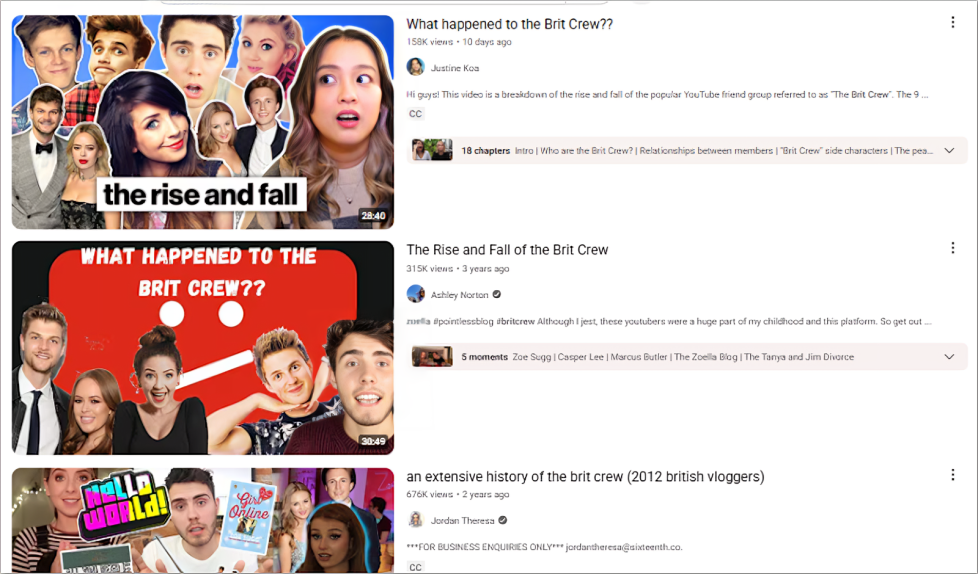
BritCrew is the term used for a group of British vloggers that started their YouTube channels between 2009-12 and created similar lifestyle vlogging content for the next 7 to 8 years. The BritCrew includes Alfie Deyes, Joe Sugg, Zoe Sugg, Marcus Butler, Jim Chapman, Tyler Oakley, Louise Pentland, and Casper Lee.
They are a perfect example of niche marketing examples as they were creating similar types of content around the lifestyle niche. Up till this date, the same brands work with most of the active members of the BritCrew, which makes it a good example of niche marketing.
2. LinkedIn Talent Solutions

LinkedIn Talent Solutions is the LinkedIn tool for hiring employees. The platform mainly uses its platform to reach out to the targeted audience. Part of the reason is that this tool is for LinkedIn users, or users need to log in to their LinkedIn accounts to use it.
Therefore, LinkedIn runs the ads for this solution on its own ad platform. That’s another example of niche marketing.
3. PakWheels AutoStore
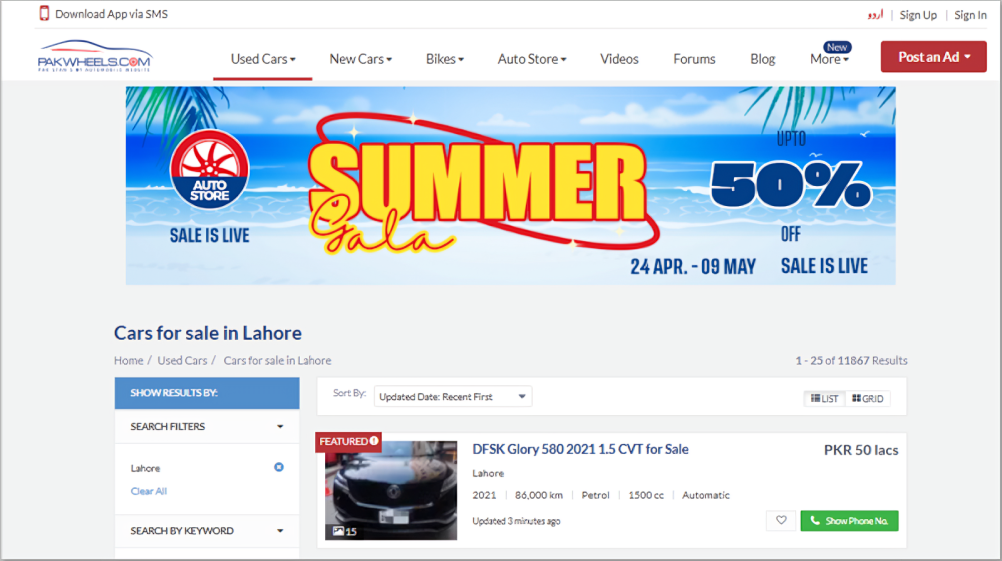
PakWheels is Pakistan’s no. 1 automobile buying and selling platform. It’s a classified ads website for automobiles. They have different monetization strategies; one of them is the auto parts e-commerce store.
PakWheels publicizes its auto parts store through its website, newsletter, and mobile app. It’s yet another perfect example of niche marketing where a brand is pushing a product to a specific audience.
4. iPhone Photography School
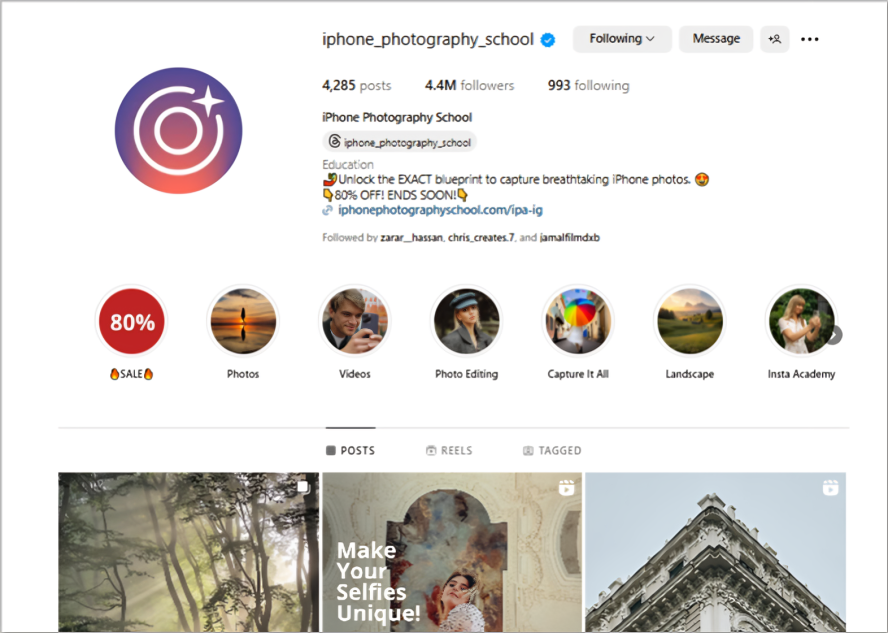
iPhone Photography School is a well-known Instagram account that shares tips and tricks on iPhone photography and videography. It also sells relevant courses for iPhone users who want to improve their photography and videography.
It’s a great example of successful niche marketing as this company uses its Instagram account to attract potential buyers on the platform.
5. Creatify Studio

Creatify Studio is an advanced video ad creation platform that uses AI to offer effective tools for designing appealing video ads.
Plus, this company uses YouTube ads to reach out to potential customers, which makes it an example of niche marketing. The reason is that they know where to look out for their potential customers.
6. Keyword Tool
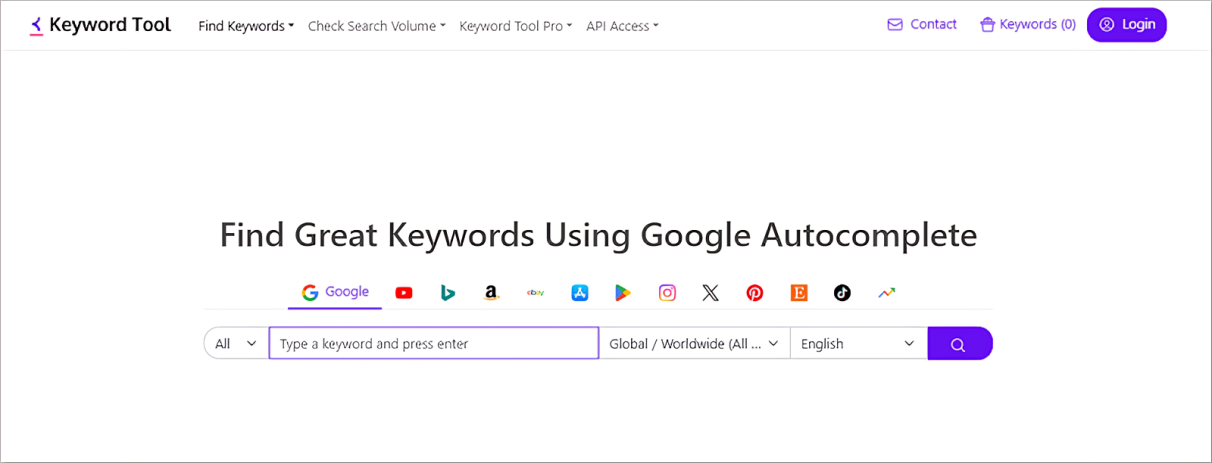
Keyword Tool is a popular keyword-hunting tool that focuses on the autocomplete feature across different search engines. It offers keyword research for Google, Bing, Amazon, eBay, YouTube, Instagram, X, and several other platforms.
However, the noticeable part is that it specifically targets “autocomplete” across all platforms, which makes it an attractive tool for certain SEOs and digital marketers who capitalize on autocomplete.
7. Pepper Content

Pepper Content is an AI-powered content creation tool with advanced solutions for skyrocketing content generation and publishing. The platform emphasizes the human + AI factor, making it stand out.
Most AI content tools adopt a hands-off publishing approach to offer ease of work, whereas Pepper Content went with a different marketing approach. No wonder they’re targeting a specific audience segment looking for an AI tool that collaborates with humans for effective outcomes.
Top 5 advantages of niche marketing
Let’s discuss some advantages of niche marketing to help understand why it matters so much:
Stronger brand loyalty
Niche audiences often feel more connected to brands that cater directly to their needs, which leads to higher brand loyalty and customer retention. It’s a huge advantage of niche marketing.
Higher profit margins
Most customers don’t hesitate to pay premium prices for specialized products or services, which increases profitability and improves ROI for companies or influencers.
Focused marketing efforts
Marketing becomes more efficient yet easier because you’re targeting a specific group with tailored messaging, reducing wasted ad spend, time, energy, and resources.
Industrial expert positioning
Serving a niche market showcases you as an expert or authority in that specific area, enhancing credibility and trustworthiness. It also helps you attract new customers.
Better customer understanding
A narrow focus helps brands deeply understand the audience’s pain points, preferences, and behaviors, leading to better products and services that serve the right audience.
So, these are some of the many advantages of niche marketing.
Future trends in niche marketing
Here are some of the future trends in niche marketing to keep an eye on:
The future trends in niche marketing may force marketing strategies to change over time. However, some changes have happened, such as mobile-first user experiences, responsive websites, social commerce, etc.
Data analysis is expected to improve massively in the long run regarding future trends. The companies that have embraced the power of data and make data-driven decisions are most likely to stand out.
The second most important future trend in niche marketing is AI. Everyone must monitor specific areas where artificial intelligence needs to be implemented or is likely to be implemented.
Therefore, whether you like it or not, these future trends will impact niche marketing.
The easiest way to manage and grow your social channels.
Try ContentStudio for FREE
Conclusion
Niche marketing empowers brands to deliver highly targeted offers and tailored solutions that resonate with specific customer segments.
In this guide, we’ve explored key strategies, highlighted their benefits, and examined emerging trends that will shape the future of niche marketing.
By focusing on a defined audience rather than trying to appeal to everyone, brands can reduce competition, deepen customer relationships, and gain valuable insights to improve their offerings.
Don’t overlook the power of niche marketing—it could be the game-changer your brand needs to stand out and succeed.
FAQs about niche marketing
Here are some of the burning questions about niche marketing:
Is the niche market good or bad?
Every business strategy has advantages and disadvantages. A niche market can be effective depending on the market factors. For instance, a niche market can be a huge opportunity if there is a demand and no competition.
How to find a niche market?
It usually begins with the ideal customer in mind and matching your skills to the potential customers’ demands. Surveys, word-of-mouth, social media research, and data analysis can help find a niche market.
Why do niche businesses fail?
The common reason niche businesses fail is that they don’t create a long-lasting, breathtaking product. Niche businesses try to develop launch plans instead of thinking through the product roadmap.
Is niche marketing expensive?
Niche marketing may not necessarily be expensive, but it optimizes ad spend, making it more targetable.
Recommended for you

Evergreen content: How to create Long-lasting traffic for your website

6 proven ways to build backlinks with content marketing for SEO


Powerful social media management software
14-day free trial - No credit card required.

